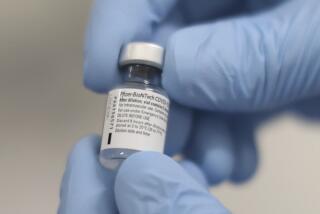UCSD to Begin Testing Cancer Drug : Medicine: Taxol has been shown to be effective against one in three ovarian tumors, but the supply has been limited.
A promising, much-sought drug that battles ovarian cancer will become available next week for the first time in San Diego County--an action made possible when the federal government recently broadened the circle of institutions allowed to use the experimental drug, taxol.
Doctors plan to start administering taxol to a selected group of ovarian cancer patients at the UC San Diego Cancer Center, which just joined the nationwide effort to test the effectiveness of the much-touted medication.
In early studies, the drug has been shown to attack the tumors of one in three cancer patients in whom other standard treatments have failed. Trying not to raise patientsâ hopes, some experts hail the drug as showing promise but emphasize that more research must be conducted.
âThis is one of the most exciting drugs weâve come across in the treatment of ovarian cancer,â said Dr. Nelson Teng, director of gynecological oncology at the Stanford University School of Medicine, where the drug has been used for more than a year. âBut this is definitely not a panacea--this will not cure all ovarian cancer.â
But the medical community is also divided on the question of taxolâs promise. Some experts say the drug, at this stage, offers more hype than potential for cures.
âThere has been a lot of promotion. The available data doesnât establish it as more effective than existing therapies,â said Dr. Christopher Jolles, director of gynecological oncology at the University of Utah Medical Center. âWe just donât know at this point.â
To the frustration of doctors and patients, taxol has been available to only a relatively small number of research institutions across the nation because the supply of the drug is very limited. Taxol is derived from the bark of the Pacific yew tree. About six 70- to 100-year-old trees must be chopped down to produce enough of the drug for one patient. Although scientists are working furiously to develop a synthetic version of the drug, they have not yet succeeded.
Every year, ovarian cancer is diagnosed in an estimated 20,000 women. And, every year, this cancer kills 12,400. When the standard treatment of chemotherapy and surgery doesnât work against ovarian cancer, a doctorâs arsenal is limited. Taxol, some say, could change that because it has been effective in trials in fighting cancer when other therapies have failed.
Because the drug has pitted environmentalists against the medical community, the conflict over the drug--as well as the hullabaloo over its promise--has hit the media. And that increased attention has increased demand. Until now, local doctors have been unable to offer the drug to their patients.
At UCSD, doctors have lobbied for more than a year to obtain taxol, said Dr. Stephen Howell, a UCSD professor of medicine.
âItâs been particularly frustrating not only for those of us taking care of cancer patients but for the cancer patients themselves,â said Howell, who is the chief investigator of the drug here.
The trial is open only to patients who are at least 18 years of age. To qualify for the drug, three regimens of the standard chemotherapy must have failed to reduce the womanâs tumors.
In San Diego, there are about 100 new cases of ovarian cancer each year; of those, about 30% would be candidates for the drug, Howell said. For these patients, the experimental drug holds more promise than any other available treatment.
âItâs very gratifying to be able to offer hope to patients who have not responded to chemotherapy,â Howell said.
But he cautioned that the drug is very toxic and that its side effects include inhibiting the bone marrowâs ability to make blood cells. Patients taking the drug have also been known to experience allergic reactions such as difficulty breathing, wheezing, nausea and a skin rash.
The drug, which will be available free, is given intravenously for 24 hours.
Doctors are particularly encouraged by taxol because it attacks cancer-causing cells in a unique fashion. The drug inhibits cancer cells by attacking microtubules, the structure that a cell uses as part of its skeleton. Taxol prevents the cancer cells from disassembling and reassembling--a way that cancer spreads throughout the body.
âThis drug is of substantial interest,â Howell said. âIt looks like a reasonably good candidate to become another of the drugs in the armamenatarium with which we treat cancer.â






